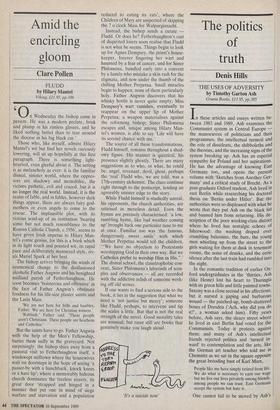Amid the encircling gloom
Clare Pollen FLUDD by Hilary Mantel
Viking, £11.95. pp.I86
0 n Wednesday the bishop came in person. He was a modern prelate, brisk and plump in his rimless glasses, and he liked nothing better than to tear around the diocese in his big black car.'
Those who, like myself, admire Hilary Mantel's wit but find her novels curiously lowering, will sit up hopefully at this first paragraph. There is something light- hearted, even gleeful about it. The setting is as melancholy as ever: it is the familiar dismal, sinister world, where the oppres- sors are shadowy and monolithic, the victims pathetic, evil and crazed, but it is no longer the real world. Instead, it is the realm of fable, and in fables, however dark things appear, there are always fairy god- mothers or even angels to come to the rescue. The implausible plot, with its riotous send-up of an institution 'bearing some but not much resemblance to the Roman Catholic Church, c.1956', seems to have given fresh impetus to Hilary Man- tel's comic genius, for this is a book which in its light touch and pointed wit, its rapid pace and deliberately mannered style, riv- als Muriel Spark at her best.
The bishop arrives bringing the winds of ecumenical change to the disillusioned alcoholic Father Angwin and his benighted midland parish of Fetherhaughton. He soon becomes 'boisterous and offensive' in the face of Father Angwin's obstinate fondness for his life-size plaster saints and the Latin Mass.
'We are not here for frills and baubles, Father. We are here for Christian witness.'
'Rubbish,' Father said. 'These people aren't Christians. These people are heathens and Catholics.'
But the saints have to go. Father Angwin with the help of the Men's Fellowship, buries them sadly in the graveyard. Not surprisingly, the bishop shies away from a pastoral visit to Fetherhaughton itself, a windswept milltown where the housewives wait on doorsteps in the hope of seeing 'a passer-by with a hunchback, knock knees or a hare lip'; where a memorably hideous church dominates the treeless streets, its great door 'strapped and hinged in a manner that put one in mind of siege warfare and starvation and a population reduced to eating its rats', where the Children of Mary are suspected of skipping the 7 o'clock Mass for Walpurgisnacht.
Instead, the bishop sends a curate — Fludd. Or does he? Fetherhaughton's cast of dispirited losers soon realise that Fludd is not what he seems. Things begin to look up for Agnes Dempsey, the priest's house- keeper, forever fingering her wart and haunted by a fear of cancer, and for Sister Philomena, bundled early into a convent by a family who mistake a skin rash for the stigmata, and now under the thumb of the chilling Mother Perpetua. Small miracles begin to happen, none of them particularly holy. Father Angwin discovers that his whisky bottle is never quite empty; Miss Dempsey's wart vanishes, eventually to reappear on the upper lip of Mother Perpetua; a weapon materialises against the reforming bishop; Sister Philomena escapes and, unique among Hilary Man- tel's women, is able to say 'Life will have its second chance with me.'
The source of all these transformations, Fludd himself, remains throughout a shad- owy figure. His manner is quizzical, his presence slightly ghostly. There are many suggestions as to who, or what, he could be: angel, revenant, devil, ghost, perhaps the 'real' Fludd who, we are told, was a 17th-century alchemist. The clues continue right through to the postscript, lending an agreeably sinister edge to the story.
While Fludd himself is studiedly unreal, his opponents, the church authorities, are satirised in merciless detail. Even the hymns are precisely characterised: 'a low, rumbling hymn, like bad weather coming up' brought back one particular tune to me at once. Familiar too was 'the famous, dangerously sweet smile' with which Mother Perpetua would tell the children, "We have no objection to Protestants worshipping God in their own way. But we Catholics prefer to worship Him in His."' The dismal school, the claustrophobic con- vent, Sister Philomena's labyrinth of scru- ples and observances — all are recorded with the addictive relish of someone work- ing off old scores.
If one wants to find a serious side to the book, it lies in the suggestion that what we need is 'not justice but mercy'; someone like Fludd, perhaps, to intervene and tip the scales a little. But that is not the real strength of the novel. Good morality tales are unusual; but rarer still are books that genuinely make you laugh aloud.
'It's a suicide note'


































































 Previous page
Previous page